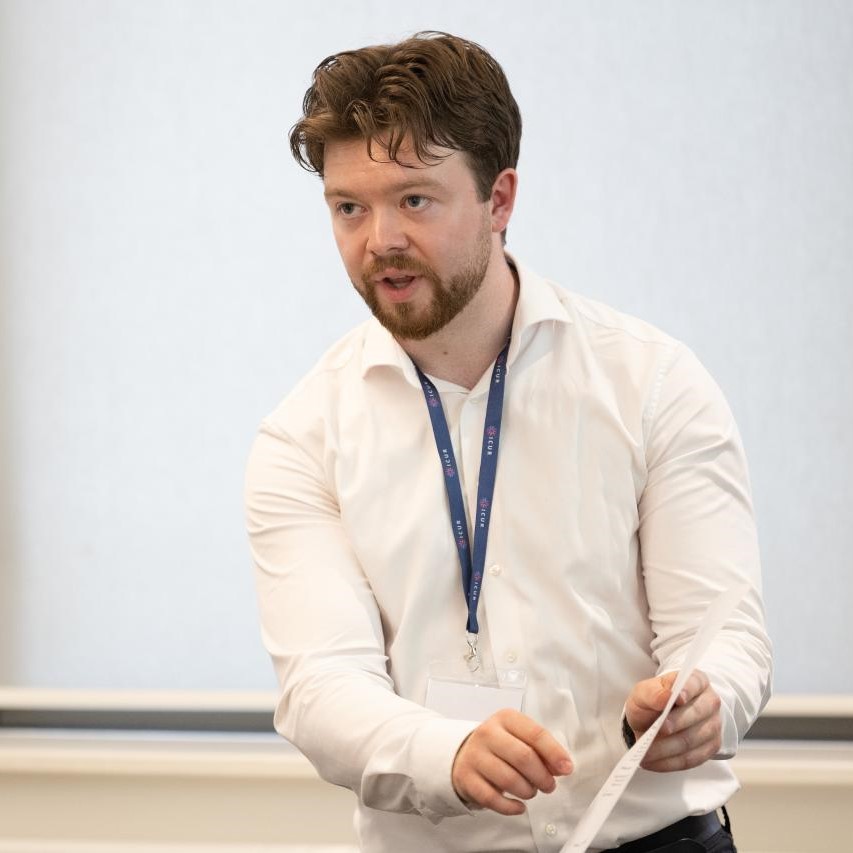IATL at 15, Celebrating Educational Innovation and the Importance of Student Research

Professor Jonathan Hickman-Heron, Director of Engagement,
Institute for Advanced Teaching and Learning

Dr Fraser Logan, Teaching Fellow,
Institute for Advanced Teaching and Learning

Dr Fraser Logan, Teaching Fellow, and Professor Jonathan Hickman-Heron, Director of Engagement, are based in Warwick’s Institute for Advanced Teaching and Learning (IATL), which publishes and supports the Reinvention research journal. As the Institute celebrates its 15th anniversary, Dr Logan and Professor Hickman-Heron spoke to Reinvention Assistant Editor & Marketing Coordinator Maddalena Parlato, sharing their insights on IATL’s principles and core activities and the importance of student research.
Maddy Parlato, Marketing Coordinator and Assistant Editor, Reinvention: An International Journal of Undergraduate Research, October 2025
1. At its heart, IATL focuses on 3 foundational principles and 4 core activities, such as Learning beyond Disciplines and Learning beyond Borders. What makes these elements particularly important and impactful to students and their learning?
Fraser: This is a lot to unpack. For me, facilitating student research is particularly important and impactful. IATL creates sector-leading opportunities for students to produce and present original interdisciplinary research. Reinvention is one such opportunity. We encourage students to see themselves, and to be seen by others in HE, as researchers in their own right, not as passive recipients of information. This is impactful because it promotes agential learning, and it ties in with many of our other activities and principles (e.g., participatory practices). Our students tell us that they enjoy taking ownership over their work and modules, and they reward us, in turn, by producing exceptional work.
IATL works across the university to develop participatory practices, research-led innovation, inclusive structures and care-rooted approaches as our foundational principles. We are a cross-faculty, academic department that leads by example, showcasing the most exciting collaborations between staff and students, which are 'co-created' with students, for students. Our activities are designed to appeal to all students at Warwick by incorporating international research projects (learning beyond borders), interdisciplinary modules (learning beyond disciplines) that foster a research-infused and enterprise-infused curriculum that enables learners to take risks.
Jonathan: From my experience, students are keen to learn beyond their studies, and across different subjects, in order to reignite their passion for learning. We see examples of this every day at IATL, through the interdisciplinary modules and student research projects. For some, the experience of studying with IATL is a step into the unknown, where they discover that they are able to research new topics with mixed methods and follow their own enquiry-led learning. This usually involves developing creative and critical skills which are transferable to their core studies and future employment plans.
2. As IATL celebrates its 15th anniversary, how do you believe its previously mentioned values have changed and evolved over the years?
Jonathan: In 2025, we are celebrating the University of Warwick’s 60th anniversary and IATL will be celebrating its 15th anniversary, having been formed from two Centre for Excellence in Teaching & Learning in 2010 (these were The CAPITAL Centre, in partnership with the Royal Shakespeare Company, and the Reinvention Centre, in partnership with Oxford Brookes University). Since then, the Institute has gone from strength to strength, establishing a global reputation for educational innovation, interdisciplinary learning and student research programmes..
Fraser: I know that IATL has a proud history of educational innovation and IATL was founded to innovate: that was, and still is, its raison d’être, as far as I’m aware. There was a time when interdisciplinarity was innovative – in some ways it still is – and IATL was at the forefront of this innovation 15 years ago with its commitment to “radical interdisciplinarity”. I’m not entirely sure what educational innovation means today. The sector is changing so quickly, especially with generative AI. Nevertheless, I think IATL’s commitment to innovation has stayed the same. If anything, it seems more committed to innovative practices than ever before. The three principles and four central activities I see as outgrowths of this commitment to innovation. We are always trying out new approaches to teaching and learning (e.g., more care-rooted approaches), rethinking assessment (e.g., with student-devised assessments), reimagining student identity (e.g., students as researchers), and so on.
3. Could you share how IATL will be celebrating its anniversary during Warwick’s 60th year, and what you think students may want to know about this event?
Fraser: We are quite lucky that Warwick’s 60th year corresponds with IATL’s 15th anniversary. Therefore, we decided to host an event that celebrates 15 years of educational innovation. There will be a series of panel discussions and workshops on this theme featuring current and former heads of IATL, IATL convenors, Reinvention Editors, ICUR Student Directors, former Early Career Teaching Fellows, IATL alumni, and more. There will also be addresses by the Vice Chancellor Prof. Stuart Croft and the PVC for Education Prof. Lorenzo Frigerio, as well as a showcase of student work in our assessment exhibition. It will be a wonderful occasion to celebrate everything that we have done, currently do, and will do in the future as a department and as a university. What may students want to know? Well, students who have been involved with IATL in any way should get in touch to be part of the event!
Jonathan: As Fraser describes above, this is an exciting moment in our department's history and will also be launching an IATL Podcast Series. We will be both looking forwards, as well as back to the past, and identifying new trends in educational innovation as emerging practices.
4. As you will be publishing an article in the upcoming issue of the Reinvention research journal, why do you believe student research dissemination projects such as Reinvention are especially meaningful?
Fraser: What is research without an audience? Nothing is worse than being excluded from the conversation. It is meaningful, for ourselves and for others, to be heard and for our contributions to be acknowledged. Students on IATL modules produce highly original work – not only in terms of content, but form. They produce artworks, videos, essays, and much more – take a look at our assessment exhibition to see for yourself! It’s important to showcase this originality, and to include student voices in research discussions, because students are often the ones with the bold ideas and new outlooks. They are the ones who can see our flaws and limitations, and help us learn; learning is a two-way exchange. Dissemination also helps students build up a research profile, which looks great to employers beyond higher education and, if relevant, may help them secure a place on a Masters or PhD programme.
Jonathan: Beyond the modules, we have seen countless examples of original student research on a number of topics, which has been published to communicate their findings with an interdisciplinary, online audience. At ICUR, BCUR and WorldCUR, we have seen students present their work globally and many publications in the Reinvention Journal have disseminated these papers to the wider world. We can now see an international network of researchers, working beyond borders and beyond disciplines, to share knowledge; this has been truly inspirational to witness.
5. Lastly, students writing for the Reinvention research journal are often publishing their work for the first time - do you have any advice for undergraduates just starting their research career, and who may want to share their work?
Fraser: My fear as a student was sharing work that was imperfect, or too honest, or or if I thought I might disagree with it in the future. I find it helps to treat each publication as a ladder. One day you may dislike everything you wrote, or your writing style, and you may wish to pull the ladder up from beneath you. But it’s important to remember that you used this work to climb a little higher, and the view is better up here. You can see more. Other people can also see you and use your ladder to reach where you are. (Just don’t lose your head in the clouds!) My advice is: try not to worry so much about how you will perceive your work in the future, or fear how others will judge it today. Publishing it is an important step in your research journey. I don’t regret my earliest publications, even though I see their flaws, because they got me where I am today, and they ensured I was involved in research conversations as early as possible. For those who are less worried about sharing their work, my advice is to keep things simple. It’s tempting to try to impress with fancy words. (I used to shoehorn the phrase “the immanentization of the eschaton” into more or less every sentence.) It’s far more impressive to disrobe yourself of pretences and say what you think in clear language that is accessible to everyone, including those from other disciplines.
Jonathan: I can't add much more to Fraser's excellent answer there, but I would agree that it's always best to simplify your message and sometimes that means using fewer words, rather than more. Beware circumlocution!
Learn more about the journal and student research opportunities in IATL:
Are you a student interested in starting your research journey? Visit Student Research (warwick.ac.uk)
Are you a member of staff interested in getting involved? Visit Student Research Staff Network Meeting (warwick.ac.uk)
Interested in publishing your research with Reinvention? Find out more at Reinvention: an International Journal of Undergraduate Research (reinventionjournal.org) or get in touch via reinventionjournal@warwick.ac.ukLink opens in a new window
